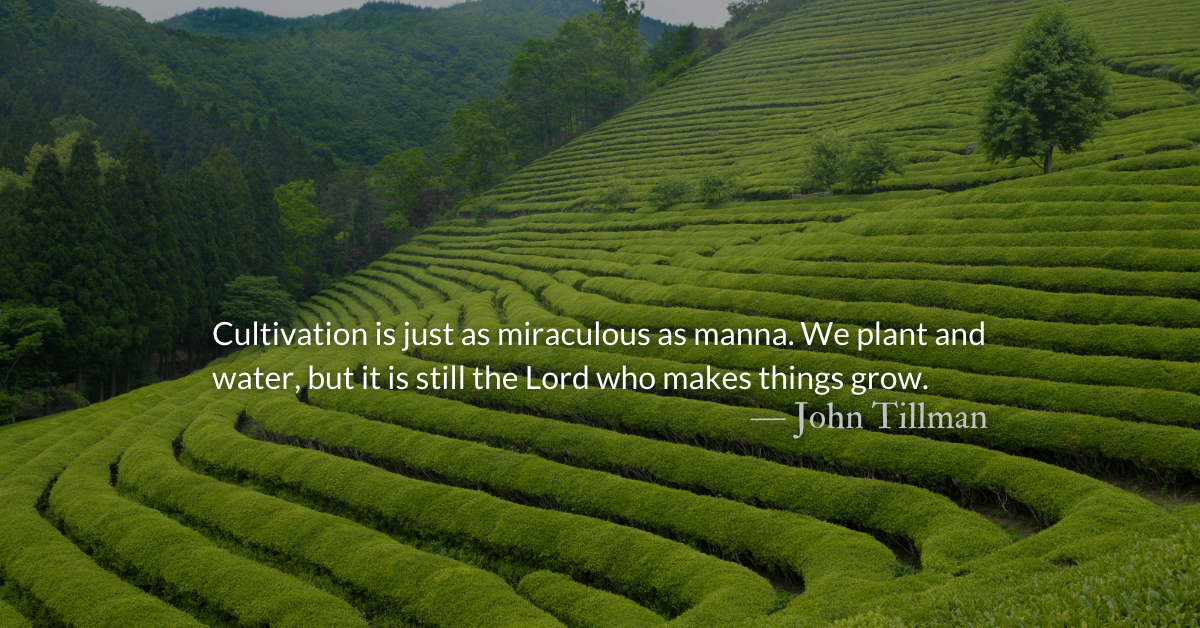Scripture Focus: Joshua 5.10-12
10 On the evening of the fourteenth day of the month, while camped at Gilgal on the plains of Jericho, the Israelites celebrated the Passover. 11 The day after the Passover, that very day, they ate some of the produce of the land: unleavened bread and roasted grain. 12 The manna stopped the day after they ate this food from the land; there was no longer any manna for the Israelites, but that year they ate the produce of Canaan.
Reflection: From Survival to Cultivation
By John Tillman
Migrants carry their world through the world. Everything precious to their lives and future is strapped to them in a backpack or a duffel bag. They often carry large amounts of cash or precious items to use for bribes and to survive on the way. I barely trust plastic grocery bags to make it from the store to my car, but migrants travel thousands of miles carrying water, food, and necessities in these bags.
After the first Passover, Israel left Egypt with considerably more than backpacks, duffle bags, and plastic grocery sacks. They had flocks and herds and wealth. Their encampment was carefully organized with strict cleanliness and purity rules. They built the Tabernacle, a magnificent mobile garden of Eden that moved around the desert with them like a mirage.
But no matter how organized or clean a migrant camp is, it is still a migrant camp. There is no planting or harvesting. There is no cultivation. There is only surviving.
At their first Passover in the promised land the people ate food from the land. They tasted the fruit of the promise. They had previously been sustained by manna, the miraculous provision of Heaven. Now they would rely on a different miracle—cultivation. They began the process of going from survival mode to cultivation mode.
Cultivation is just as miraculous as manna. We plant and water, but it is still the Lord who makes things grow. The one in whom we trust is the same one who provided manna in the wilderness.
Cultivation has a different responsibility. Manna could not be saved or shared. They gathered only for themselves. In survival mode, nothing lasts until tomorrow.
Shifting from survival to cultivation, we both save and share. Cultivation creates bounty and resources intended to bless the community and invest in the future.
There is no shame in being migrants. The Lord sustains them—often through us. (Deuteronomy 10.18-19; 24.14, 17; 27.19) But God’s calling and promise are to cultivation. (Micah 4.4) It is through cultivation of faith that we have plenty to share with those in survival mode.
Are you in survival mode or cultivation mode?
Do you pray only in crisis? Or do you plant prayers, allowing them to grow roots and sprout?
Do you forge scriptures into weapons to fight others? Or do you form scripture into a plowshare, dragging its blades through the soil of your heart, casting out stones and weeds?
Divine Hours Prayer: The Refrain for the Morning Lessons
“Because the needy are oppressed, and the poor cry out in misery, I will rise up,” says the Lord, “And give them the help they long for.” — Psalm 12.5
– From The Divine Hours: Prayers for Summertime by Phyllis Tickle.
Today’s Readings
Joshua 5-6.5 (Listen 7:25)
Colossians 2 (Listen 3:27)
Tuesday’s Readings
Joshua 6.6-6.27 (Listen 4:47), Colossians 3 (Listen 3:09)
Read more about Jericho’s Wall
God isn’t interested in destroying people we call our enemies
Read more about Over Jordan
When we cross over the Jordan with Christ, the land has no enemies to be defeated.






